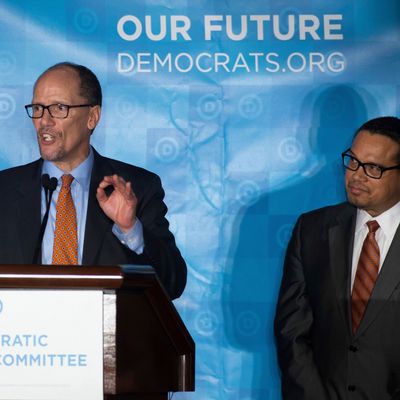
In any other context, Tom Perez’s election as DNC chair might have been recognized as a major accomplishment for the party’s insurgent left wing. A former distinguished head of the Civil Rights Division of the Justice Department, and a powerful voice for workers’ empowerment as secretary of Labor, Perez was often considered the most progressive member of Obama’s cabinet. When his name briefly emerged as a possible running mate for Hillary Clinton last summer, one of his main selling points was his ideological affinity to Democrats unhappy with Clinton’s reputation as a Wall Street–friendly centrist.
But after his narrow second-ballot victory in the contest for the DNC chairmanship over the weekend, Perez now stands as an Establishment party leader anxious to placate a Bernie Sanders constituency that was passionately invested in Representative Keith Ellison’s candidacy. For many of the People of the Bern, placing Ellison (a key and early Sanders supporter) at the head of the party would have been a sign of their retroactive vindication after the bitter 2016 presidential nomination defeat, and an appropriate gesture of humility for Obama and Clinton loyalists who led the party to a calamitous general-election loss. What made the outcome worse for them is that Ellison had been the early front-runner; his loss felt like yet another narrowly unsuccessful effort to change the party, rebuffed at the last minute by the shadowy and sinister forces of the Establishment.
Perez, of course, moved immediately to placate Ellison supporters by naming (as part of a prearranged mutual unity plan) the Minnesotan deputy chair.
There are varying assessments of how successful Perez will be in unifying the party; Donald Trump will obviously provide a common enemy of gargantuan proportions (and indeed, his facetious expressions of sympathy for Ellison as the victim of another Hillary Clinton–engineered “rigged” election won’t help Sanders bitter-enders). But to the extent that the forces behind both the Sanders and Ellison candidacies view themselves as a permanent movement with deep roots in various efforts to resist corporate/centrist influences on the party dating back many decades, there will be no easy or automatic “turning of the page.”
Policy analyst and Twitter commentator Matt Bruenig probably spoke for many former Bernie-or-busters in decrying Perez’s election as a sign the Establishment would never give up the party without a fight, and in calling on the left to concede nothing going forward:
[T]he left should focus its energies on organizing under alternative institutions that, if they engage with the Democratic party at all, only do so in order to attempt hostile takeovers of various power positions (including primarying moderate Democrats and winning local party positions). Only a sucker would do more than that, given what the party has just shown itself to be about at this time.
If this sort of talk sounds familiar, it is precisely the sort of “hostile takeover” rhetoric we heard from the tea-party movement on the right, particularly following the GOP’s 2012 defeat. They, too, had big ambitions for defeating their party’s Establishment via primaries. Perhaps the left insurgents imagine themselves pulling off something like Dave Brat’s stunning victory over House Majority Leader Eric Cantor in June of 2014.
But I would argue the real story of the Republican primaries of 2014 was that again and again the Establishment defeated tea-party challengers by preempting their message and agreeing to their policy demands. It is entirely possible the Democratic Establishment will take a similar tack. Indeed, you could argue that by getting behind Perez as the DNC candidate, non-Sanders Democrats have already initiated a process of preempting the Bern. Dave Weigel notes how different the Establishment response was in the similar context of a previous presidential defeat:
In late 2004, when Howard Dean entered the race to run the DNC, some Democratic leaders put forward a candidate of their own — former congressman Tim Roemer of Indiana, a centrist who had served on the 9/11 Commission. It was a debacle, with progressives picking over Roemer’s spotty record on abortion rights and Social Security. The candidate quit within weeks.
Perez is a very different kind of Establishment leader.
Now obviously preempting the “populist” uprising is to a considerable extent a matter of common sense, and not necessarily some sort of insincere factional coup. Democrats are all feeling, and sharing, the grassroots pressure to abandon past “centrist” tactics like “reaching out” to Trump as many Democrats did to George W. Bush, or identifying some sort of agenda that appeals to Trump voters by repudiating progressive policies. The kind of high turnout Democrats need for a reversal of fortune in scattered elections this year and the 2018 midterms will not likely be generated by a move to the center. The Republican landslide of 2014 depended on a similar calculation that loud-and-proud base politics would work in the diminished electorate of a non-presidential contest against the party of a less-than-popular incumbent.
You can contend, however, that the Republican decision to embrace the tea party while crushing the life out of it as a party faction had some unintended consequences: laying the groundwork for a non-Establishment presidential candidate who had no particular principles other than inchoate defiance of all Establishments. Again and again, Donald Trump’s rivals were self-estopped by their own extremism from successfully challenging Trump’s.
Democrats today, left and center, are in a very different position from the Republicans of the recent past. Party divisions over policy are a lot less numerous, and Democrats are united in wanting to use government for positive purposes in a way Republicans haven’t exhibited in 40 years. But the age-old challenge remains for partisans of every variety: keeping eyes on the prize of general-election victories instead of the fool’s gold of dominating one’s own party. That’s as true for the Democratic Establishment types who keep frustrating left insurgents as it is for the insurgents themselves.






























